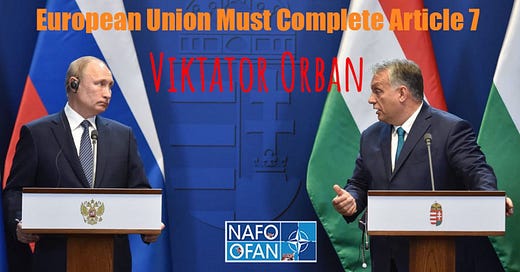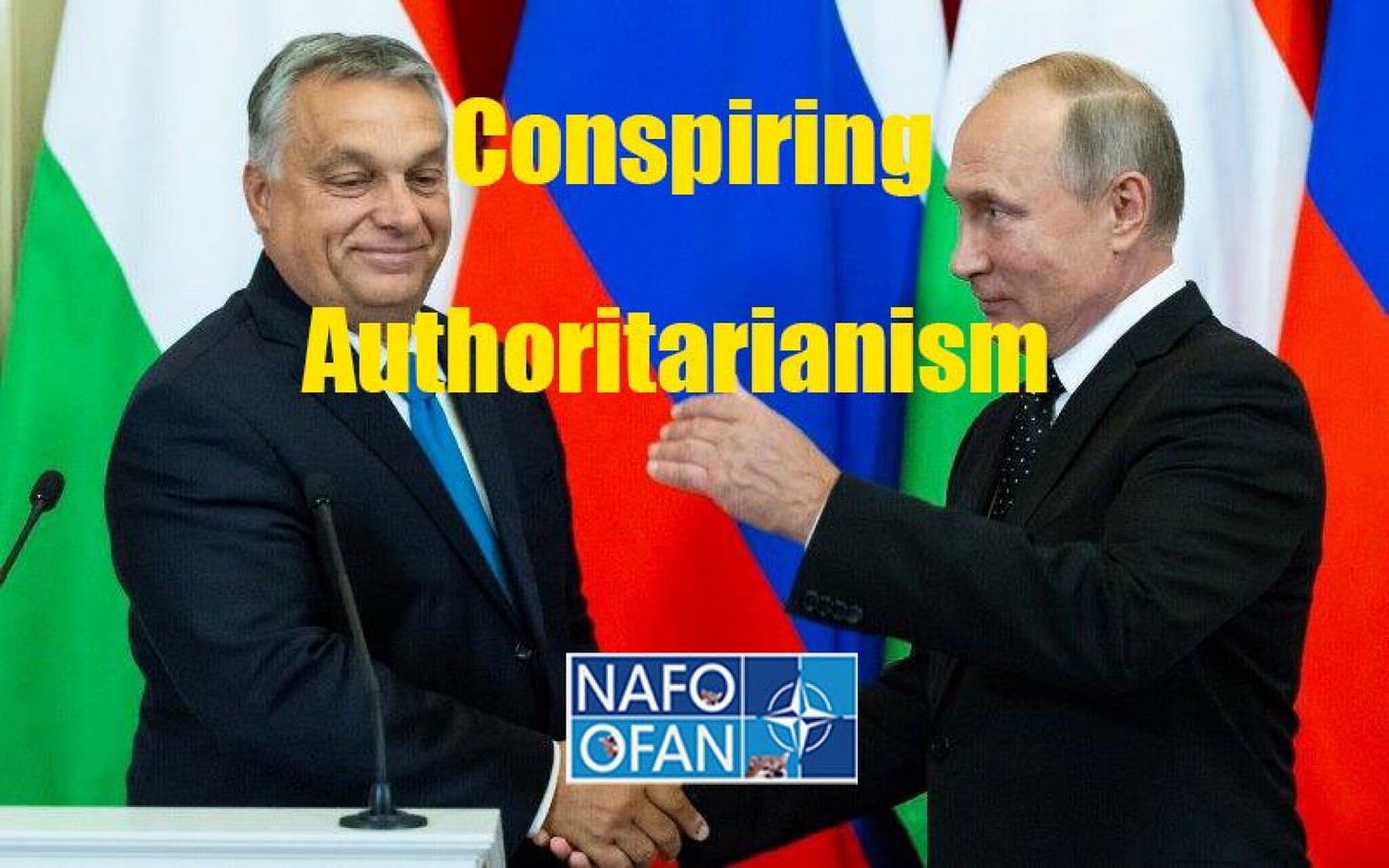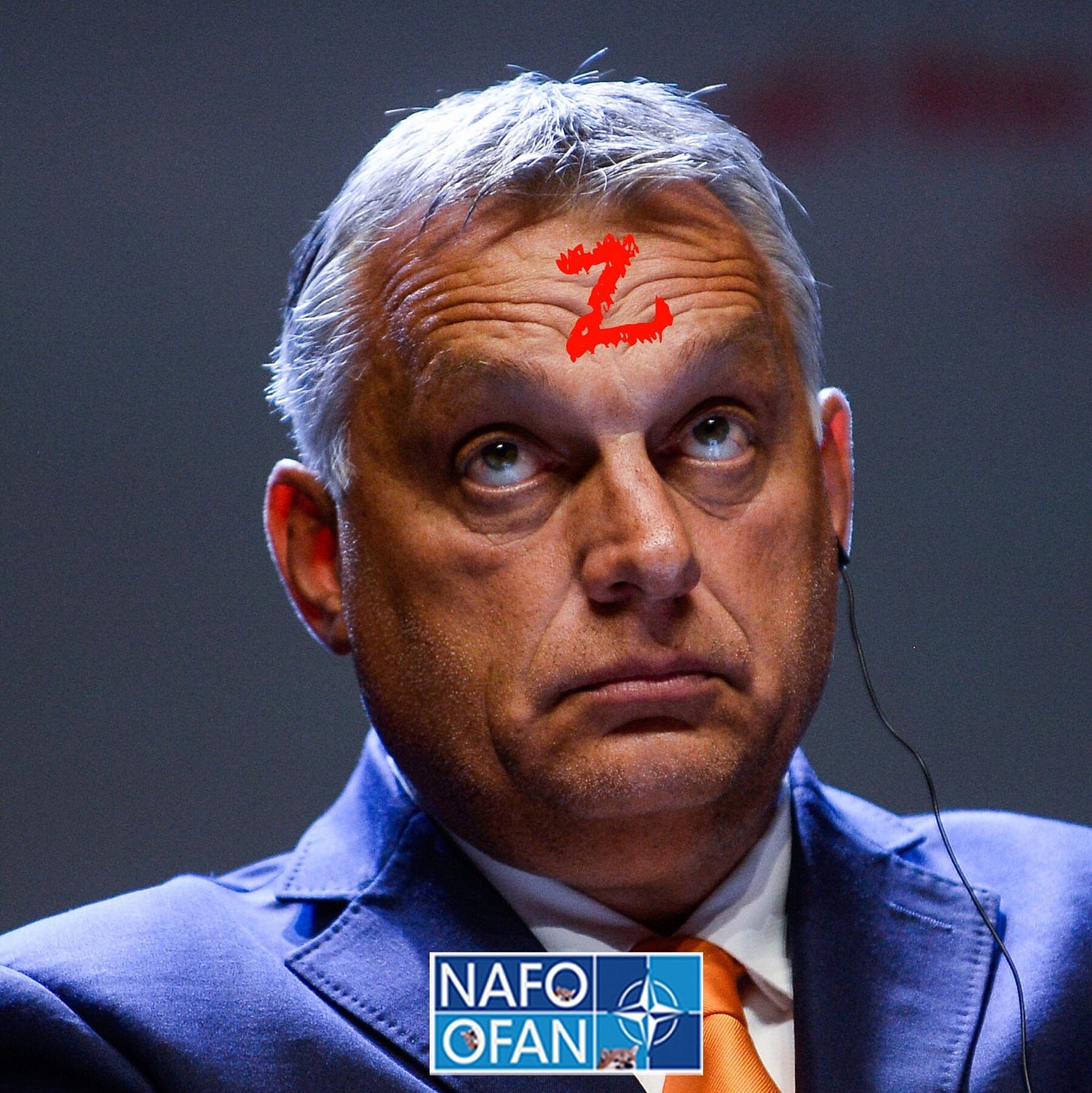It’s time to suspend Hungarian membership rights for serious and persistent breaches of the principles of the European Union.
In this video, we explain the European Union Article 7 process, specifically in relation to Hungary.
You can watch the YouTube presentation of this thread here 👇
youtu.be/HiMyVOOvnj8
Back in January 2024, The European Commission announced that it would will not push forward Article 7, the so-called nuclear option, against Hungary over breaches of fundamental rights until there is a strong majority in favour among member states.
Article 7 has in fact already been invoked against Hungary, back in 2018. Breaches of EU Principles were defined and agreed upon with Hungary, with specific remedies for these breaches agreed to - together with a grading of the breaches and timelines for the remedies were agreed with Hungary as a pathway to the resumption of EU funding.
The problem is that while Victor Orban and his regime has not only failed to remedy the breaches, he has in fact doubled down on some of the breaches in areas such as the judiciary and immigration rules, with a limited number of breaches being remedied and partly remedied. It is the European Commission that is responsible for progressing the Article 7 to the sanction phase, with clear grounds to do so as Hungary has failed to remedy a substantial number of breaches agreed with Orban and his right wing regime in 2018.
The Commission’s position is one of ambivalence and inaction, they claim there is insufficient member state support to progress the Article 7 sanctions which could or should result in Hungary being muted and denied a vote in EU affairs. In January 2024, after notifying Hungary of their failure to remedy breaches - the Commission put out this statement:
"It's not possible for the Commission to take a decision in the process," Didier Reynders, the European Commissioner for Justice As recognised by Transparency International, “the past decade has seen sustained attacks on the EU’s fundamental values by one of its own member states.
For the past 13 years, Hungary’s government has launched a barrage of laws aimed to erode its democracy, all while continuing to benefit from EU funds, as well as enriching its cronies through widespread corruption.
There is well-documented evidence that it has privileged granting public contracts to its supporters, diverted EU funds to its associates, subdued the country’s judicial system, undermined media freedom and pluralism, demonised non-governmental groups and criminalised some of their activities, eroded academic freedoms, violated the rights of women, refugees, asylum seekers, LGBTQI+ people and other minorities.
In a scathing resolution voted in January, the European Parliament demanded Article 7 shift to second gear and conclude the "existence of a serious and persistent breach" of fundamental rights inside Hungary. But this new step, which has never been activated, requires a written proposal by the European Commission or one-third of member states.
Attacks on the rule of law in Hungary are systemic and deeply rooted. Not only do they threaten to unravel decades of democratic progress, but they also pose a direct threat to the European Union’s democratic legitimacy and access to the European Single Market. The EU cannot claim to be democratic if one of its own member states persists in violating the democratic values upon which the EU was founded.
Next 👉 The EU’s response
The EU’s response to these developments has so far failed to deter Hungary from continuing to slide backwards into authoritarianism. Hungary has faced numerous Article 7(1) hearings in the Council of the EU and debates in the European Parliament, which have sought to establish that there is a risk of a “serious and persistent breach” of EU values in Hungary.
Yet no recommendation on this has been issued by the Council for five years and the process remains stuck. Hungary has also been the subject of multiple European Parliament resolutions and been harshly criticised by the European Commission in its various assessments and reports.
The repeated and systemic attacks of the Hungarian government on EU values have led to EU funds being frozen and to Hungary being subject to the EU’s rule of law conditionality mechanism.
In total, Hungary’s actions are under scrutiny by three separate instruments: the horizontal and thematic enabling conditions under the EU Charter of Fundamental Rights, which enables access to Cohesion Policy funding; 27 super milestones under the EU’s Recovery and Resilience Fund, which include measures such as combating corruption and rule of law reforms; and the rule of law conditionality mechanism, which imposes measures to protect the EU budget against breaches of the rule of law.
While Hungary may have undertaken some cosmetic reforms to unblock its EU funds, analysis by our partners in Hungary shows that these fail to address the remedial measures and reforms required.
In fact, the Commission’s own latest assessment is that “despite regular exchanges with Hungary, the Commission considers that Hungary has not addressed the breaches of the principles of the rule of law that led to the adoption of measures by the Council in December 2022 under the budget conditionality mechanism.”
The Commission also determined that Hungary had failed to fulfil the conditions it had proposed and committed to remedy. These breaches are related to public procurement, public interest trusts, prosecutorial action, conflicts of interest and the fight against corruption.
The Commission itself, then, has tacitly recognised that Hungary has undertaken multiple breaches of the principles of the rule of law, and failed to address these adequately. This goes beyond the risk of a “serious and persistent breach” of EU values, as stipulated by Article 7(1).
This is why Article 7(2) proceedings must be initiated. Article 7(2) would mark the first step to determining the existence of such a serious and persistent breach of EU values, as opposed to the mere risk outlined in Article 7(1). Upon confirming such a breach, which has been evident to the European Parliament since at least 2018 —when the Article 7(1) procedure against Hungary was launched—the Member States would be able to proceed to the second step under Article 7(3), potentially resulting in the suspension of specific membership rights to Hungary, including voting rights in the Council.
The last European Council meeting in December once again showcased Hungary’s obstructionist behaviour, including blackmailing the institutions and threatening to veto decisions on key policies. A strong response from Member States, as well as the EU Institutions, to these actions that deliberately undermine the Union’s functioning is now more critical than ever.”
Again in June 2024, EU M E P’s voted overwhelmingly on a resolution calling for Article 7 to be completed against Hungary.
There were the obvious detractors from this vote, primarily from Spain
From Italy and Germany
And other mostly right wing parties, who have sought to rally on russian narratives around the illegal and genocidal war being conducted by Russia in Ukraine.
Next 👉 What is Article 7 you ask..
What is Article 7 and why is it so important?
Firstly let’s have a quick run through on the ARTICLE 7 process.
‼️ Article 7.1 The preventative mechanism ‼️
In the event of a clear risk of serious breach of EU values, a proposal is made by either the European Parliament, the European Commission, or one-third of EU countries (not including the accused country).
👉 Next - the accused country can respond to the Council of the EU, which can issue recommendations to the country
👉 Next, the EU Parliament approves the recommendations by a two-thirds majority
👉 Next the EU Council votes, four-fifths of the council must decide there is a "clear risk of a serious breach" by the accused country
👉 Next, The Council will "regularly verify" country is still in breach.
👉 The next step is set out in Article 7.2, where a serious and persistent breach of EU values is evident.
👉 Next, a proposal is made by either one-third of EU countries or the European Commission
👉 Next a response is made by the accused country, "submitting its observations"
👉 Next, the EU Parliament must approve by a two-thirds majority
👉 Next, the EU Council must vote unanimously* that there is a "serious and persistent breach" by the accused country
👉 The final step is found under Article 7.3, known as the sanctioning mechanism
👉 THE COUNCIL VOTES (again) by a "qualified majority" to suspend rights of the accused country, including voting rights.
‼️ Next, The accused country remains bound to the principles of the European Union and still has to fulfill all its other duties. They are effectively muted from voting and a say in EU policy and actions. ‼️
Sanctioning Hungary for severe breaches of the principles of the European Union by Hungary under Article 7 of the Treaty on European Union, allows for the possibility of suspending European Union (EU) membership rights (such as voting rights in the Council of the European Union).
If a country seriously and persistently breaches the principles on which the EU is founded as defined in Article2 of the Treaty on #EuropeanUnion (respect for human dignity, freedom, democracy, equality, the rule of law and respect for fundamental rights, including the rights of persons belonging to minorities). Nevertheless, that country’s membership obligations remain binding.
In accordance with Article 7, on the proposal of one third of EU Member States, or of the European Parliament or of the European Commission, the Council, acting by a majority of four fifths of its members, having obtained the Parliament’s consent, may determine that there is a clear risk of a serious breach of these fundamental principles by a Member State, and address appropriate recommendations to it.
Article354 of the Treaty on the Functioning of the European Union lays down the voting procedures to be used by the main EU institutions when a Member State faces the application of Article 7. The country in question does not take part in the vote. It is not included in the calculation of the one third of countries required for the proposal or the four fifths required for the majority. Parliament’s consent requires a two-thirds majority.
Next 👉 The mechanics of invoking Article 7
The detailed mechanics of invoking and enforcing sanctions against Hungary under Article 7 :
👉 1. On a reasoned proposal by one third of the Member States, by the European Parliament or by the European Commission, the Council, acting by a majority of four fifths of its members after obtaining the consent of the European Parliament, may determine that there is a clear risk of a serious breach by a Member State of the values referred to in Article 2. Before making such a determination, the Council shall hear the Member State in question and may address recommendations to it, acting in accordance with the same procedure.
The Council shall regularly verify that the grounds on which such a determination was made continue to apply.
👉 2. The European Council, acting by unanimity on a proposal by one third of the Member States or by the Commission and after obtaining the consent of the European Parliament, may determine the existence of a serious and persistent breach by a Member State of the values referred to in Article 2, after inviting the Member State in question to submit its observations.
👉 3. Where a determination under paragraph 2 has been made, the Council, acting by a qualified majority, may decide to suspend certain of the rights deriving from the application of the Treaties to the Member State in question, including the voting rights of the representative of the government of that Member State in the Council. In doing so, the Council shall take into account the possible consequences of such a suspension on the rights and obligations of natural and legal persons.
The obligations of the Member State in question under this Treaty shall in any case continue to be binding on that State.
👉 4. The Council, acting by a qualified majority, may decide subsequently to vary or revoke measures taken under paragraph 3 in response to changes in the situation which led to their being imposed.
👉 5. The voting arrangements applying to the European Parliament, the European Council and the Council for the purposes of this Article are laid down in Article 354 of the Treaty on the Functioning of the European Union.
The argument for progressing the Article 7 procedure against Hungary: Hungary’s pervasive and systematic non-compliance with EU values, spanning several critical domains.
Article 7 of the Treaty on European Union was designed as a safeguard against such breaches, stipulating that any persistent violation of foundational EU principles—such as democracy, rule of law, and human rights—should trigger serious consequences, potentially including the suspension of Hungary’s voting rights.
Next 👉 A summary of breaches by Hungary, providing indisputable grounds for the application of Article 7
Breaches by Hungary are as follows:
👉 1. Rule of Law and Judicial Independence:
The 2023 legislative reforms adopted by Hungary are insufficient in addressing the systemic issues within the judiciary. Key elements of judicial independence remain compromised:
- The president of the Curia retains significant power with limited accountability, undermining impartial oversight.
- The case allocation process lacks transparency, raising concerns about fairness.
- The independence of the National Judicial Council (NJC) is compromised by political and administrative pressures, exposing it to potential government interference.
These issues align with long-standing EU concerns, and Hungary's failure to implement meaningful reforms signals a disregard for foundational judicial principles.
👉 2. Anti-Corruption and Conflict of Interest
Hungary’s track record on anti-corruption is also cause for concern. There are clear indicators of high-level corruption that remains uninvestigated, weak anti-corruption frameworks, and political influence over prosecutorial services.
- The absence of significant progress in investigating and prosecuting high-profile corruption, combined with weak regulations on lobbying and asset declarations, creates an environment of unchecked power.
- The Integrity Authority’s limited resources and powers hinder effective oversight.
The inability to address corruption contributes to a growing lack of accountability, putting Hungary at odds with EU standards and damaging public trust in the integrity of governance.
👉 3. Media Freedom and Pluralism
Media freedom is essential for democratic debate, yet Hungary exhibits worrying trends:
- The public media system lacks independence, often echoing government narratives.
- Smear campaigns against journalists and media professionals discourage independent reporting.
This concentration of media influence stifles free discourse and enabling government control over information.
👉 4. Constitutional and Electoral System Deficiencie
Hungary’s electoral framework suffers from inequalities that disadvantage opposition voices. Emergency powers, extended through a perpetual “state of danger,” provide broad, unchecked government authority to bypass normal legislative processes.
This state of affairs reflects an intentional weakening of checks and balances—an essential democratic safeguard—and minimizes public influence on key legislative decisions.
👉 5. Civil Society Restrictions
Hungary’s laws and policies restrict civil society, creating a hostile environment for NGOs and community organizations:
- Laws targeting foreign-funded organizations, along with government harassment and surveillance, signal a broader suppression of independent voices.
- Preferential treatment for pro-government organizations further erodes the diversity of civic engagement.
👉 6. Financial Mismanagement of EU Funds
Concerns about financial mismanagement have persisted, as EU funds intended for public interest are often subject to weak oversight:
- Hungary’s reluctance to join the European Public Prosecutor’s Office (EPPO) obstructs EU-level checks on the misuse of funds.
- Inadequate controls and auditing mechanisms, along with systemic irregularities in public procurement, undermine the sound financial management of EU resources.
👉 7. Fundamental Rights Violations
Hungary has also faced criticisms over discrimination against minorities and vulnerable groups, including the Roma, LGBTIQ communities, and asylum seekers.
Next 👉 Conclusion
Conclusion:
We cannot give Viktor Orbán the opportunity to use corruptly diverted EU funds to keep his oligarch state alive, or continue to allow Hungary a vote in the EU’s affairs - as it has adopted a pro-russian and pro-putin line on Ukraine, and repeatedly veto’s any EU support packages by the European Union.
It will be more appropriate to organise aid to Ukraine without Hungary’s interference and frustration of aid and weapons packages, by withdrawing Hungary's voting rights under the Article 7 procedure, as the European Parliament has long been calling for.
So far, Hungary has only delivered reforms on paper, and even then not sufficiently. Given these persistent and extensive issues, the Article 7 process is a necessary step to protect the EU’s foundational principles.
The Hungarian government’s limited reforms, coupled with continued infringements across the judiciary, media, civil society, and fundamental rights, indicate that Hungary is systematically failing to align with EU standards.
By advancing the Article 7 process, the EU can reinforce its commitment to safeguarding democratic values and the rule of law across all member states.
It will also mute Viktator Orban and Hungary, in their designed and intended frustration of any and all measures by the European Union, in support of Ukraine.
👉 Article 7 vrs kicking them out of the EU.
This argument is simple. Kick Hungary out of the EU and they will no longer be bound by the principles of the European Union - it will give Orban free and unfettered reign to continue on his pro-russia, pro-putin and pro-china authoritarian rule and oppression of the people of Hungary.
Article 7, the most extreme sanction available - will have the effect of ensuring no EU funding is paid to Orban and his regime, while denying Orban of any voting rights and influence in the day to day affairs for the EU. Being a member of the EU will also have restrictive obligations, though incomplete - around the alignment towards other authoritarian regimes such as Russia, China and North Korea.
Don’t forget, that while it is fair to say that Orban has been elected consecutive elections, there is a very large portion of the Hungarian national that is pro-democracy, anti-Orban and his corruption and pro-EU. We should not abandon them, we need to support them and push to expose Orban’s rampant corruption and state capture - from banks to media organisations that masquerade as unbiased news reporters - but are in fact organisation owned by the corrupt Orban and his family and connections.
Kicking Hungary out the EU is a bad idea for all the reasons listed.
End
TheYouTube edition of this thread is available here 👇
Belligerent Hungary and the European Union. Why Article 7 needs to be completed.
Folks, I self-fund my equipment, research and subscription costs. I would appreciate your coffee support ! If you enjoy my threads, please help me keep the threads free, it takes just a few minutes to support my work on Patreon or BuymeACoffee - in any currency.
👇 Informative, evidence lead research for the price of a few coffees!
Thank You! to those who have supported me on Patreon or buymeacoffee, you are simply awesome.
buymeacoffee.com/beefeaterfella
patreon.com/Beefeater_Fella
References and sources:
https://transparency.eu/why-the-eu-must-trigger-the-article-72-teu-procedure-against-hungary/
https://www.euronews.com/my-europe/2024/01/29/eu-commission-wont-trigger-nuclear-option-against-hungary-until-theres-clear-majority-in-f
https://www.reneweuropegroup.eu/news/2023-12-12/viktor-orbans-blackmail-cannot-determine-europes-future
https://eur-lex.europa.eu/legal-content/EN/TXT/HTML/?uri=CELEX%3A12012M007
https://www.legislation.gov.uk/eut/teu/article/7
https://howtheyvote.eu/votes/168862
For my visually impaired followers and for easy listening on your daily commute, my threads are narrated too! - see the reply to this tweet for an audio narration of the thread:
https://trinitymedia.ai/player/share/75132f91f5a05cf1c4b6b361565cd61b811c













I am a UK expat living in Hungary since 2017. Orbán has systematically restricted all opposition, controlled the media, denied a basic freedom of democratic protest, infiltrated the judiciary with his cronies, bled the country dry of the EU funds that have been forthcoming while syphoning it off to his many friends, family members and associates, allowing critical infrastructure, roads, railways, schools and hospitals to decline and fall into disrepair all while criticising the EU and the hand that feeds him. Article 7 is well over due but I won’t hold my breath 🤬
The Hungarian miscreant routinely refuses to comply with EU directives and conducts himself in an appaling fashion. It's time Hungary were permanently expelled as they'll never leave voluntarily